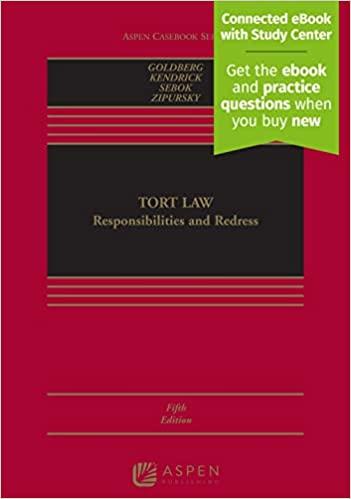Question
Elon Musk, the flamboyant CEO (chief executive officer) of Tesla, the electric car company, announced in 2018 that he had 'funding secured' to take his
Elon Musk, the flamboyant CEO (chief executive officer) of Tesla, the electric car company, announced in 2018 that he had 'funding secured' to take his company back into private ownership (Campbell and Pooley, 2018). Tesla had been listed on the Nasdaq exchange in 2010 and was worth over $70 billion. Taking it private would involve a mammoth undertaking to buy out the investors, and it soon emerged that he did not have the means to accomplish this feat. He faced legal action from the US regulator, the Securities and Exchange Commission, for making false statements. While Musk attracted investors in Tesla because of his appeal as a technological visionary, they have reason to be concerned about his sometimes erratic behaviour and statements. Most entrepreneurs can appreciate the feelings of frustration arising from the external pressures on their companies when they become publicly listed. Market analysts are constantly focused on the latest share price, with little long-term view of the health of the company. Financial results are typically reported four times a year, leading to tensions surrounding expectations each quarter. There are numerous other regulatory obligations that pertain to public companies. For example, whereas a private company can appoint any directors it wishes, the public company is obliged to appoint some independent directors, who can represent the wider interests of all the investors. This is a protection for the investing public but can be seen by founders as an obstacle to realizing their vision. Because a range of investors and their interests are involved, the public company is in the glare of publicity. A larger-than-life entrepreneur, such as Richard Branson, has been keen on media attention when marketing his products, but has objected to media attention when it focuses on how his companies are run. His company, Virgin, was floated in 1986, but taken private again two years later. The traditional CEO is careful in all media communications, aware that any statements could be misinterpreted and have a negative impact on the company's share price. Many entrepreneurs in today's high-flying tech companies are the opposite of this traditional CEO. They have grown their companies rapidly, often attracting outside investors who have seen the potential of their innovative ideas in the process. This attraction helps to explain the popularity of Tesla's shares, which translated into rising share prices, despite weak financial performance in the company's carmaking business. The modern entrepreneur's drive and vision can seem incompatible with the constraints of the listed company.
Questions
What were the factors in Tesla's success?
Would you advise investing in Tesla, or would you consider it too risky an investment?
Find out more
Step by Step Solution
There are 3 Steps involved in it
Step: 1

Get Instant Access to Expert-Tailored Solutions
See step-by-step solutions with expert insights and AI powered tools for academic success
Step: 2

Step: 3

Ace Your Homework with AI
Get the answers you need in no time with our AI-driven, step-by-step assistance
Get Started


